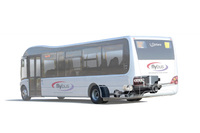Flybus project aims to cut fuel costs and emissions for buses

The government-backed Technology Strategy Board is to help fund a new £1-million British-led 'green research' programme involving a flywheel-based mechanical hybrid Kinetic Energy Recovery System (KERS) for fitment to buses and commercial vehicles.
Transmission specialist Torotrak (Development) Ltd, the world leader in full-toroidal traction drive technology, will head the new “Flybus” programme with two consortium partners: leading international automotive engineering and technology provider Ricardo UK and Optare plc, the country’s leading supplier of eco-friendly, integrated single- and double-deck buses. Allison Transmission Inc., the world’s leading manufacturer of medium- and heavy-duty automatic transmissions for commercial vehicles will also be involved, supporting the project with hardware and integration expertise.
The Flybus consortium will utilise Torotrak’s patented Continuously Variable Transmission (CVT) technology together with a high-speed composite flywheel for energy storage which has been developed by Ricardo UK, and which is known as ‘Kinergy’. Both technologies have already undergone development as part of a flywheel-based mechanical hybrid KERS which has been designed for use in motorsport. The innovative mechanical hybrid system will offer the commercial vehicle sector an unprecedented, low cost opportunity to drastically cut CO2 emissions and deliver fuel efficiency savings of 20 percent. With further optimisation, Torotrak believes that there are possibilities to significantly improve this.
The Technology Strategy Board is to provide £0.5-million for the Flybus research programme as part of its Low Carbon Vehicles initiative, with the consortium partners jointly matching this investment. The aim is to demonstrate a flywheel-based mechanical hybrid system in an Optare Eco Drive Solo bus and to confirm the benefits of mechanical hybrid systems, effectively KERS-based technology, for fitment as original equipment in new commercial vehicles and, significantly, also as a retrofit system for updating existing vehicles. The consortium plans to demonstrate the new low emissions, high fuel efficiency vehicle to bus companies, fleet operators and regulatory bodies both in the UK and beyond.
The successful development of a mechanical hybrid system suitable for commercial vehicle applications will provide UK industry with a significant opportunity to manufacture and sell 'green hardware' for both newly-built vehicles and existing bus and truck fleets across the world.
Whilst electric hybrid systems have already been developed for bus applications and have demonstrated useful fuel savings, such chemical battery-based solutions add considerable weight and complexity, lead to increased whole-life costs due to regular battery replacement and also raise associated environmental and disposal issues. In contrast, mechanical hybrids have been shown to offer up to twice the efficiency of a typical battery-based electric hybrid system in a package that is half the size, half the weight and a quarter of the cost.
The demonstration project will focus initially on installing an existing Torotrak CVT and Ricardo supplied flywheel in the Optare Solo bus, connecting the mechanical hybrid system directly to the Allison automatic transmission already fitted to the vehicle as standard equipment. The majority of the application, integration, development and test work will be undertaken by Torotrak in partnership with Ricardo, while Optare and Allison – providing, respectively, the test vehicle and an Allison 2000 Series transmission hardware together with control integration support – will also offer their series manufacturing expertise.
Torotrak's Engineering Director, Roger Stone, says the main target of the programme will be to demonstrate significant fuel economy and CO2 improvements. "Simulation work by Torotrak, based on an Optare Solo bus and using the readily available 60kW system with 400kJ of energy storage capacity proposed for this first demonstrator, produced fuel savings of 20 percent over the official UK bus test cycle,” explains Stone.
“In this initial project, the CVT and flywheel hybrid system will be applied to the vehicle’s driveline through the existing and previously unused Power Take-Off (PTO) facility incorporated within the standard Allison automatic transmission. Further simulation shows that an optimised system, using a 110kW system with 1MJ energy storage capacity, will produce further significant improvements in fuel savings over the same test cycle.
“Given the long service life of buses, the availability of a simple hybrid system – one which can be factory-fitted to new vehicles or retrofitted to an existing vehicle to radically reduce fuel costs and CO2 emission levels, at modest cost – will be particularly welcomed by bus companies, commercial vehicle fleet operators, Regional Authorities and the UK Government,” adds Stone.

